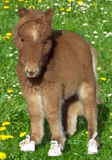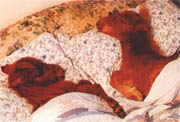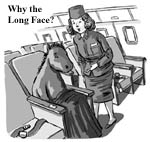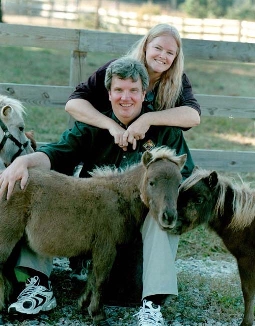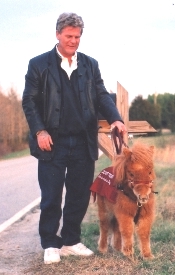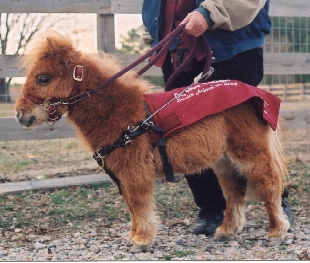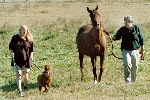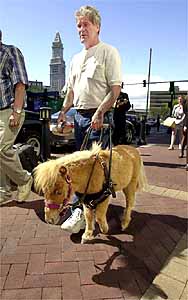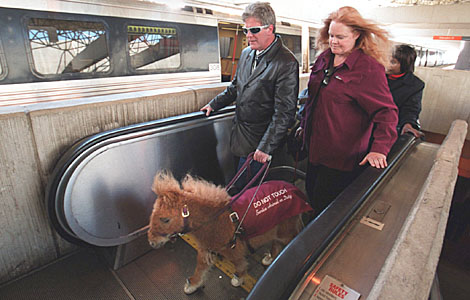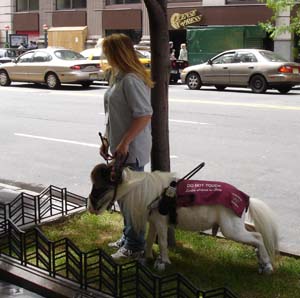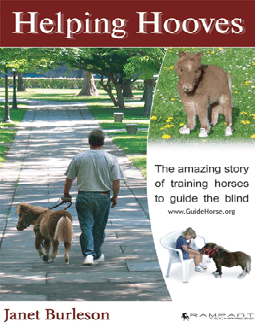|
|
Message From the Guide Horse
Foundation Concerning the use of Full Size Horses Indoors: The Guide Horse Foundation is against the use of riding size horses indoors because of the risk of injury to the horses, the blind handler and the general public. While our research has indicated that Miniature horses make suitable guide animals, large guide animals of any species can create a hazard for the public when used in an inappropriate setting for an animal of that size. The Guide Horse Foundation Mission: Our mission is to provide a safe, cost-effective and reliable mobility alternative for visually impaired people. The Guide Horse Foundation is committed to delivering Guide Horses at no cost to the blind, relying on un-paid volunteers and charitable donations to pay all travel and housing expenses for the blind handler's on-site training.
The Guide Horse Program: The Guide Horse Foundation was founded in 1999 as an experimental program to access the abilities of miniature horses as assistance animals. There is a critical shortage of guide animals for the blind and guide horses are an appropriate assistance animal for thousands of visually impaired people in the USA. In early experiments, Guide Horses have shown great promise as a mobility option, and people who have tried Guide Horses report that the Guide Horses perform exceptionally well at keeping their person safe. These friendly horses provide an experimental alternative mobility option for blind people. People who have tried Guide Horses report that the horses demonstrate excellent judgment and are not easily distracted by crowds and people. Guide horses are not for everyone, but there is a strong demand for Guide Horses among blind horse lovers, those who are allergic to dogs, and those who want a guide animal with a longer lifespan. An international Poll by the Discovery Channel showed that 27% of respondents would prefer a Guide Horse if they required a guide animal. Who is the Ideal Guide Horse Owner?The Guide Horse Foundation has had exceptional interest from the following types of people:
Why use a mini horse as a blind guide? There are many compelling reasons
to use miniature
horses as guide animals. Horses are natural guide animals
and have been guiding humans for centuries. In nature, horses
have been shown to possess a natural guide instinct. When another
horse goes blind in a herd, a sighted horse accepts
responsibility for the welfare of the blind horse and guides it
with the herd. With humans, many blind people ride horses in
equestrian competitions. Some blind people ride alone on trails
for many miles, completely relying on the horse to guide them
safely to their destination. Through history, Cavalry horses have
been known to guide their injured rider to safety. The Guide
Horse Foundation finds several characteristics of horses that
make them suitable to guide the blind:
Who can train a Guide Horse? Training any guide animal requires many years of full-time training experience. Because the blind people entrust their lives to their horses, only professional horse trainers with at least ten years of full-time riding and horse training experience should attempt guide training. Janet Burleson, the first person in the world to train a Guide Horse, is a retired professional horse trainer with more than 30 years of full-time horse training experience. During her professional career, Janet trained thousands of horses including national top ten champion performance horses. Noted as one of the world's pioneering horse trainers by Practical Horseman Magazine, Janet Burleson is considered a leading authority on horse training techniques. While the Guide Horse Foundation publishes details of the Guide Horse Training Program, we strongly discourage any attempts at Guide animal training by those who are not qualified. The book "Helping Hooves" is now available for those who would like to learn more about training Guide Horses. We also have a new newsletter. The Guide Horse Foundation relies on volunteers to donate, train and deliver trained Guide Horses free-of-charge to visually impaired individuals. Visit our cooperative efforts, sponsors or mini sales pages. The Guide Horse Foundation has the utmost respect for The Seeing Eye® and their seventy-two years of outstanding work with assistance animals for the blind. Please note that The Guide Horse Foundation is not affiliated with or sanctioned by the Seeing-Eye® or any of the Guide Dog training organizations. oracle training |
Got a Question? Click Here for Answers! Click here to buy the book! |
Guides Training Press Photos News Apply FAQ Wishes Contact Home
|
|
Copyright © 1998 - 2005 by the Guide Horse Foundation Inc. Guide Horse ® Guidehorse ® and Helping Hooves ® are registered trademarks. |
The Guide Horse Foundation has the utmost respect for The Seeing Eye® and their seventy-two years of outstanding work with assistance animals for the blind. Even though the press often calls our horses "seeing eye horses", please note that The Guide Horse Foundation is not affiliated with or sanctioned by the Seeing-Eye® or any of the Guide Dog training organizations. Seeing-Eye® is a registered trademark of the Seeing-Eye, Inc.
betting på sportmatcher . https://www.free3d.org/ . Join tournaments at Genesis Casino for a chance at real cash prizes and rewards.
Golf Instruction
remote dba sites include Aegis, fast-track, oracle-training
